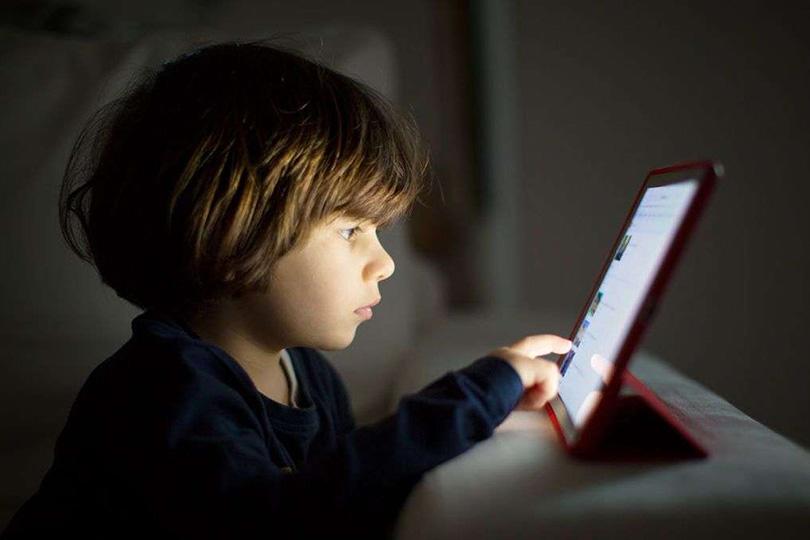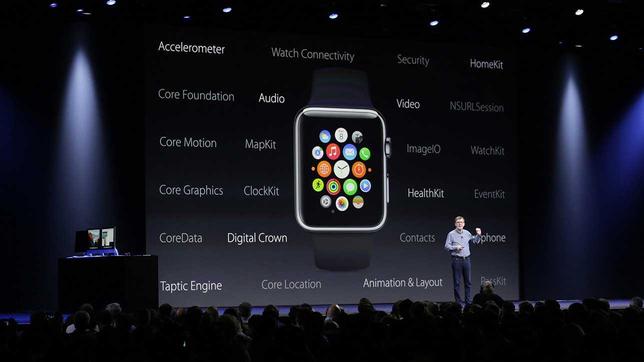Parenting: How do electronic screens affect our children?
Even before my baby girl spoke her first words, she had managed to tell which of the mobiles in the house belonged to me and which belonged to my husband, even though our phones were identical in shape. As a result, my child would scream if anyone but me would pick up my phone. Rather, she strongly objected, if she saw me giving it myself to someone else, to show him a picture stored on it, for example.
For her, this phone was as much a part of me as my shoes or clothes, since it was in my hand or next to me almost all the time. At that time, she was very concerned with protecting everything that concerns me with perseverance and determination.
Perhaps the previous example reveals how modern electronic devices with screens have become part of our daily lives, in a way that has never happened before. Of course, this does not conflict with recognizing the fact that a device such as a mobile phone has become incomparable to any other device, in terms of helping its owner determine walking directions, browse social networking sites, conduct online shopping, enjoy audiobooks and other activities, despite Personally, I am trying very hard to reduce the time I use it.
Because none of my baby's grandparents live near our house, my phone has been an indispensable way to stay in touch with them, especially since I haven't seen my mother since 2019, due to the general closure measures and current travel restrictions.
With devices like this now becoming ubiquitous, whether we like it or not, it has become imperative that our children are able to recognize their presence quickly, easily, and also instinctively. My other child was known to have a stigma, and apparently before he was a year old, the phone screen would light up if we ran our fingers over it.
Skip topics that may interest you and continue reading topics that may interest youTopics that may interest you at the end
In contrast, we all know that the use of such devices is addictive, and that they shape our children's minds, in ways that we are only now slowly beginning to understand. Although these devices are not at all harmful, at the same time they are far from being useful either. In this sense, learning how to improve our use of it, or knowing when to stop using it, will produce sustainable positive effects.
In any case, the fear that any external influences may distort the thoughts of our children is not new. Even Plato was concerned that poetry and drama might affect young minds. Similar concerns have arisen, since televisions have become a staple in every home, which has led parents to warn of the emergence of a generation of children addicted to watching it. Perhaps this is what prompted the writer Roald Dahl, to include his famous story “Charlie and the Chocolate Factory” published in 1964, rhymed phrases in English, in which he urgently pleads with parents, to throw the televisions out, and to replace them with a beautiful shelf against the wall, Books are stacked on it.
Skip the podcast and keep reading My Teen Podcast (Morahakaty)Teenage taboos, presented by Karima Kouh and prepared by Mais Baqy.
Episodes
podcast end
While we know for certain that reading has many benefits in terms of developing a range of children's cognitive abilities, these youngsters are growing up now, in a world teeming with electronic devices equipped with screens, which makes their use of them paint a somewhat disturbing picture. Estimates from some studies indicate that children from the age of one day to two years of age interact with such media for more than three hours per day, a number that has doubled over the past two decades.
Other studies show that 49 percent of school-age children use screen devices for more than two hours a day, and that 16 percent of them use screens for more than four hours.
The increase in the period devoted to these devices may come at the expense of the time children devote to physical activities, which leads to an increase in the so-called "body mass index", and a decrease in the number of meals eaten by family members together. And it turns out that this is also linked to a decrease in the period of sleep, both for young people and adults. Studies have indicated - for example - that children who have televisions in their rooms sleep 31 minutes less than their counterparts who do not have this option.
Although all this seems disturbing at first glance, it turns out that television - for example - is not necessarily harmful, and that watching some educational programs on its screen can benefit young people, provided that they are more than two years old or more, as those who are younger than So, they don't generally benefit at all.
Fortunately, some clever producers of TV content have inserted educational elements into their screen. A notable example is the American television series "Sesame Street", which seeks to teach children colors, numbers and letters in fun ways. At the same time, it was found that educational content presented on television helps to improve the cognitive skills, behaviors and ability to read and write in children between the ages of three to five years.
"It wouldn't be very bad for kids if it was about carefully crafted educational TV content," says Kathy Hirsch-Pasek, a researcher in the Children's Language Laboratory at Temple University in Philadelphia. It would be absolutely terrible for young children, if we were talking about watching the evening news, for example, or programs full of scenes of violence, which we all watch on TV now."
The same applies to other media and communication. Children can benefit from spending time using electronic devices that allow them to interact with others, such as making video calls with relatives, listening through the same means to a story told to them from a distance, or watching educational programmes. The benefits arising from such activities are due precisely to their interactive nature.

The problem is that children often don't use electronic devices with screens for these useful purposes, and for good reason. For example, during the current year, fathers and mothers are facing unique pressures, especially after the differences between personal life and work life have faded in unprecedented ways. This is why young people use electronic media negatively, which may have a detrimental effect on them. In this regard, one study reports that children’s listening to new vocabulary, whether from a person who deals with them directly, or delivered to them through interactive video communications, increases their ability to learn it, compared to listening to it while it is repeated in front of them on screens, while they are sitting and not moving. still.

On the other hand, everyone understands that young children's brains develop rapidly, and that their interaction with their parents or caregivers is critical in determining the way in which they learn new experiences. Excessive use of electronic devices with screens affects the way they interact with their outside world. And here brings us an example that, although infants as young as 15 months of age can learn new vocabulary through tablets, this does not mean that they will still face difficulties in applying what they learn in real life.
Studies have shown a relationship between TV viewing and a decrease in what is described as "creative imagination". A recent study revealed that school-age children's use of electronic media with screens reduces their skills related to "imagining," a term that refers to how we use our minds to imagine people, places or events.
The ability to "imagine or visualize" is a feature shared by humans all over the world, and allows them to develop a "mental perception" of events in the real world, without having to be a participant in them. It's all about reading something, imagining ourselves in the spot where the lines go.
When he sets out to do something, “a neural structure forms in my brain, which gives me the opportunity to correct the way I do it internally, even before I even start doing something,” says Sebastian Suget, lead author of the study on this topic and an expert in language development at the University of Regensburg, Germany. I do it in real life."
This study included 266 children, between the ages of three and nine years. The organizers assigned them to perform a task to test their ability to mentally imagine twice during the 10-month research period. In this context, these children were asked questions such as: "Which is brighter: the trumpet or the violin?" And “Which one has a pointed tip more than others: the nail or the pen?”
Such questions helped the youngsters to benefit from their ability to visualize and mental imagination, to determine the nature of the things that surround them, which made them assert, for example, that a round stone is smoother than a nail, by comparing the "mental image of them", without any of them being In front of the child already.
And the research team discovered a link between all forms of electronic device use with screens, with a decrease in the growth rates of the ability to mental image during the year that lasted for the study. This negative effect did not differ according to the way these devices were dealt with, and whether it was passive and without any interaction on the part of the child, such as what happens when watching television, or in a more interactive way, such as their playing video games.
Now, can you close your eyes for a moment, to imagine the last time you were in a swimming pool? If you do this, you will find that it will be easier for you in that case, imagine how you felt the water surrounding your body, and remember its smell, and how slippery the floor was at that time. The experience is so clear, if you rely on the experience of watching someone swim as nothing more.
This is due to the fact that the electronic device that you saw these clips on its screen, in this case, performed the “imagination task” on your behalf in a way, as it provided information to your eyes and ears, without allowing the rest of your senses such as touch and taste, to engage in dealing with command. Soget says that the first ten years of a child's life, as well as his teenage years, is the appropriate period for developing his abilities at the level of the senses.
So, how can parents understand and benefit from all these details, in light of the fact that modern electronic devices have become a part of our lives, whose importance is constantly increasing?
The good news in this regard is that it is easy for parents to help children use their imagination and mental image skills, while reducing their reliance on electronic media. All they need in this context is to allow their children to play, especially since "mental imagination" is the basis for playing interactive games, according to Soget.
The more young children participate in games that involve imaginary and virtual scenarios, the more they are able to benefit from their imagination in this regard, which is important, given that the increasing period of children's use of electronic media coincides with their spending limited time in the open air, in a way that did not happen before.
“Of course, we all live in the modern age, when modern screen devices are unavoidable. It's not about telling parents that what they're doing isn't helpful enough, it's probably about trusting that the child's instinct is It will push him to search and explore, and to allow the young ones to engage in these real-life experiences that are rich and rich in information and experiences.
But it may not be that easy, for many parents. Therefore, it is important for them to understand that the effects of children's use of electronic media differ, even if those devices are similar in their screens. Although the umbrella of media such as this includes mobile phones, tablets, televisions and their counterparts on which video games are played, tablets in particular - those that only appeared a decade or more ago - have changed, for example, the way the process of distance education is conducted .
Therefore, young people can benefit from dealing with media that allow them to interact with what is happening on its screens, and offer them well-crafted contents. These benefits are due - as Hirsch-Pasek says - because the pattern of use here is "interactive and adaptable, unlike its counterpart through which most similar electronic media are dealt with, which is sitting still and passively listening (or watching), which makes The child tends to be lazy."
During the closure period that was applied to prevent the outbreak of the Corona epidemic, this researcher and her colleagues studied how preschool-aged children interacted with the stories that were thrown at them virtually, which showed similar results, to what the research team concluded itself, when it addressed the issue of children learning new vocabulary. . The study showed that youngsters can benefit from and understand the stories that are told to them - during video communication - in a way that does not differ from the extent to which they benefit and understand them, if it is told to them by someone who actually sits with them.
The study also revealed that the children of the research sample were more interactive and responsive when stories were told to them directly via video technology, compared to the nature of their response to the same stories, when they listened to it while it was recorded.
This shows us that the benefits that accrue to children from their use of modern electronic devices depend on the extent to which these media benefit from interactive factors, which we all realize are important to the learning process. It can be said that these benefits are relative and vary. Although youngsters responded better to a live video broadcast than they interacted with a recorded version of the video content itself, studies have shown that four-year-olds can still learn from these recorded versions, even if they show less interaction with it.
So, Hirsch-Pasek says, we should not judge the experience of using electronic devices with two contradictory options: they are either beneficial or harmful, but rather that some of them may be useful as a tool to stimulate social participation, not as a substitute for it.
But at the end of the day, we also have to realize that excessive use of these media, even for educational purposes, may negatively affect our children's ability to imagine the real world in which they live.










